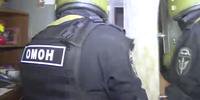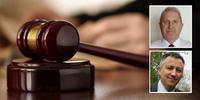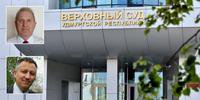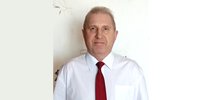The Case of Gobozev and Potapov in Votkinsk
Filter
- #
Investigator of the District Department of Internal Affairs of the Investigative Committee of the Russian Federation for the Udmurt Republic, Major of Justice Dmitry Ponomarev initiates a criminal case against 42-year-old Mikhail Potapov and 63-year-old Sergei Gobozev. Believers are charged with organizing the activities of an extremist organization.
- #
In the city of Votkinsk, security forces conduct searches in 7 homes, as well as in the workplaces of Jehovah's Witnesses. After that, the believers and their family members are interrogated. Among them is an 80-year-old woman who has a stroke due to the stress she has experienced, she is taken to the hospital by ambulance.
Sergey Gobozev's apartment, where he lives with his wife and mother-in-law, is being searched in his absence. Operatives seize Sergey's personal belongings: driver's license, car documents, veteran's certificate. In addition, they take electronic devices, an album with photographs and various translations of the Bible, including the Synodal edition.
Operatives detain Sergey in a hospital in the city of Izhevsk, where he brings his wife to the reception. He is taken to the Investigative Committee for interrogation, a personal search is conducted and sent to a temporary detention facility.
Mikhail Potapov's home is also searched, after which he is handcuffed for interrogation at the Investigative Committee, and then left in custody.
FSB investigator Ponomarev prosecutes Gobozev and Potapov as accused of organizing extremist activities. This is how the investigation interprets conversations on biblical topics using video and audio communications.
- #
The Industrial District Court of Izhevsk chooses a measure of restraint in the form of detention for Mikhail Potapov. Sergey Gobozev was placed under house arrest for health reasons.
- #
Measures of restraint for believers are extended until April 20: Potapov is detained and Gobozev is placed under house arrest.
- #
Preventive measures for believers are extended until May 20.
- #
Investigator Ponomarev prosecutes Sergey Gobozev as a defendant in committing a crime under Part 1 of Article 282.2 of the Criminal Code of the Russian Federation (organizing the activities of an extremist organization).
According to the investigation, Potapov and Gobozev used a video conferencing program on computer and mobile devices to remotely hold meetings of a banned extremist religious organization.
- #
The Industrial District Court of Izhevsk decides to replace the measures of restraint for two believers. Both are chosen to prohibit certain actions.
- #
It becomes known that in the course of the preliminary investigation, representatives of various religious denominations were questioned as witnesses: a representative of the Russian Orthodox Church, the pastor of the Izhevsk-Yagul community of the Lutheran Church, the chairman of the local organization of Orthodox Judaism and the Jewish community of the city of Izhevsk, and the deputy head of the administration of the regional spiritual administration of Muslims of Udmurtia, who, in their collegial opinion, decided that Jehovah's Witnesses "deny traditional and ethno-cultural values of the peoples of the Russian Federation".
- #
The case goes to the Votkinskiy District Court. It was appointed to Judge Tamara Makarova.
- #
First meeting. 9 people come to support the believers, but no one is allowed into the hall.
The hearing was postponed because the defendants were not informed of the date of the trial and Gobozev was not assigned a lawyer.
- #
Due to illness, Mikhail Potapov and his lawyer do not appear in court. The session lasts 6 minutes.
- #
The judge satisfies the defense's request for admission of listeners to the hearings. The judge decides to consider the motion to return the criminal case to the prosecutor after the indictment has been read out.
- #
The petition of believers to refuse lawyers by appointment is not satisfied.
The prosecutor reads out the indictment. The judge then rejects the motion to return the case to the prosecutor.
- #
The defendants express their attitude to the prosecution. They claim that they did not commit unlawful acts and did not have the intent "to commit a crime against the foundations of the constitutional order and the security of the state." "Therefore, in the criminal case," explains Mikhail Potapov, "there are no facts confirming this unfounded statement of the investigation ... Law enforcement agencies inappropriately freely interpret the decision of the Supreme Court, which did not establish a ban on the practice of the religion of Jehovah's Witnesses."
The defendants consider the charges "illegal, unfounded, far-fetched and politically motivated."
2 witnesses in the case are being interrogated. Both women confirm that they did not hear any extremist calls from the defendants.
With the permission of the judge, the prosecutor reads out the protocols of interrogations, as he sees serious discrepancies with the testimony of witnesses in court. The women claim that they were pressured by the investigator during the interrogation; He threatened one of them with deprivation of parental rights.
- #
Mikhail Potapov's wife is being interrogated. She characterizes her husband as a kind, decent, caring person. She did not hear any extremist statements from him. According to her, he has no bad habits and there have been no complaints against him from his place of work; Relations with neighbors are good.
During the interrogation of the next witness, it turns out that she does not know the defendants well, and her testimony in court does not coincide with what she said during the investigation.
The prosecutor proposes to compare the texts of the testimony and reads out the interrogation protocol. The woman claims that many of the words written there do not belong to her, for example, that Potapov and Gobozev spoke negatively about power and religion. In addition, the witness doubts the authenticity of some of his signatures on the interrogation protocols.
She also says that the investigator wrote down in advance in a notebook the text that she had to read on camera during the interrogation. If a woman added something on her own, then the recording was made repeatedly, she was threatened with deprivation of work, housing and insulted.
- #
A prosecution witness, a disabled person of group III, is being interrogated. He says that in worship services, Jehovah's Witnesses are encouraged to obey the laws of the state; He had never heard any extremist appeals or negative statements from any of the defendants. The witness states that during repeated interrogations the investigator put pressure on him and did not record his testimony verbatim.
- #
The questioning of prosecution witnesses is ongoing. Two of them state that the investigation put pressure on them during the interrogation and that they only partially understood the meaning of the protocol they signed.
Another witness admits that he slandered Gobozev and Potapov, and retracts his testimony. He explains that he did this because of stress, as well as under the influence of negative information about Jehovah's Witnesses on the Internet. He adds that he currently has no negative feelings either towards the defendants or towards Jehovah's Witnesses in general. He acknowledges: "With Jehovah's Witnesses, everything is done according to the law. Some literature was banned, and an announcement was immediately made for all parishioners to destroy it."
- #
Another prosecution witness, who once turned to Sergei Gobozev for legal assistance, is being interrogated. He says that until 2017 he attended the services of Jehovah's Witnesses, he liked them. According to the witness, the defendant Gobozev spoke of the authorities in an extremely positive way; He never expressed superiority over others and did not call for the rejection of blood transfusions.
Another witness says that he saw Potapov once and does not know him at all.
Due to the contradictions in the words of the next witness, the prosecutor asks to read out his written testimony. After that, the witness states that he did not read the interrogation protocol and the testimony was recorded inaccurately.
Another witness, who has known the defendants for many years, characterizes them as decent and sympathetic people: "Potapov is a good family man, he does not smoke or drink. He likes to travel. And Gobozev is calm, helps in legal matters. He treats his wife well."
- #
Ekaterina Churakova, a leading specialist of the Department of Harmonization of Interethnic Relations of the Ministry of National Policy of the Udmurt Republic, is interrogated; Chairman of the Church Council of the Old Believer Community of the City of Izhevsk Sergey Lepikhin; pastor of the Izhevsk-Yagul community of the Lutheran Church Alexander Grebennikov; Chairman of the local organization of Orthodox Judaism and the Jewish community of the city of Izhevsk Mikhail Golub.
The defense draws attention to the fact that these witnesses are not specialists or experts and are not personally acquainted with the defendants. Consequently, their testimony reflects a personal opinion and cannot be used as the basis for a verdict, as it is inadmissible evidence.
Witnesses show that they dislike Jehovah's Witnesses. Lepikhin admits that he received information about this religion from the media, Grebennikov justifies his negative attitude by the difference in beliefs. When asked whether the religion of Jehovah's Witnesses has been banned in Russia, Golub replies: "Religion cannot be banned." Witness Churakova admits that she "was not specifically involved in the organization of Jehovah's Witnesses."
- #
The secretary of the Izhevsk diocesan administration, Deacon Ilya Medvedev, is being interrogated, who admits that he is not a religious scholar and cannot assess the religion of Jehovah's Witnesses. However, he expresses his own negative attitude towards this confession, basing his arguments on the book of the "sectologist" Alexander Dvorkin. Medvedev confirms that he has not heard calls against the state from Jehovah's Witnesses, and considers "non-recognition of national traditional values" to be extremism.
- #
During 7 sessions, the prosecutor reads out volumes of the case from 3 to 8, containing transcripts of audio recordings of worship services. Defendants are allowed to comment on them.
Mikhail Potapov declares that the words that are attributed to him in the case file do not actually belong to him. And on one of the dates of worship, he was absent from Russia, as evidenced by the marks in his passport.
- #
At two sessions, the court listens to 3 discs with audio recordings of divine services, the total duration of which is at least 12 hours. In addition to the participants in the process, several listeners are present in court.
The defense draws attention to the fact that some transcripts of the files are repeated twice in the case file. The lawyer also states that the discs listened to contain recordings of worship services of believers, and not meetings of the LRO of Jehovah's Witnesses. He draws this conclusion on the basis of the fact that the issues discussed at the meeting differ from those described in the charter of the LRO and are exclusively religious in nature.
In addition, there are no extremist statements on the audio recordings, there are no calls to overthrow the constitutional order or to disobey the authorities, but on the contrary, there are incites to love.
- #
Over the course of three meetings, transcripts from the disc are read out, and at the last meeting, audio recordings of poor quality are listened to.
- #
The judge rejects Gobozev's request to refuse a lawyer.
The court reviews video files from the case file and listens to audio recordings that are of very poor quality. It turns out that the votes noted by the investigator as belonging to Gobozev and Potapov are not actually such. In some recordings, voices are not identified at all, and conversations are conducted on everyday topics.
Gobozev draws attention to the fact that the listened audio files are not a record of the meeting of a legal entity, since the rules for holding meetings of the LRO are regulated by the instructions of the Ministry of Justice and are documented in protocols. Baby crying can also be heard on the audio recordings. The defense draws attention to the fact that children cannot attend the meeting of legal entities.
- #
Listening to audio recordings from the case file continues. One of them contains a prayer uttered by a third person. On the other, there is a conversation allegedly between Potapov, who works as a driver and delivers bread, but the defendant has never worked as such.
- #
Listening to audio recordings continues, one of which includes advice to respect authority.
According to the prosecutor's office, "unidentified persons deliberately carried out actions of an organizational nature, organized gatherings, meetings and management." However, it is not possible to identify them in court. The case file also states that the defendants "used literature of an extremist nature," but it is not possible to establish which one.
Gobozev and Potapov draw the judge's attention to the fact that the evidence of their illegal activities, provided by the investigation in the form of audio and video files, does not actually contain signs of an extremist crime.
- #
The court continues to examine the audio and video files from the case file. The recordings contain conversations on everyday topics: moving to another city, car problems, health, etc. Among other things, discussions of biblical advice on raising children are listened to. Often the voices of other people are heard not of the defendants, but of other people.
- #
Listening to audio and video recordings continues.
The defense file a motion to exclude from the case file video files that are out of sync - the sound does not match the image.
- #
The judge asks the prosecutor's opinion on the motion to exclude out-of-sync video files.
The prosecutor believes that the application is not subject to consideration, the files can be used as the basis for the accusation. The judge decides to attach the petition to the case file.
The court also completes the listening to audio recordings of telephone conversations.
- #
A witness for the prosecution, the head of the department for interaction with public and religious organizations in the administration of Votkinsk, is being interrogated. She explains that on duty she had a chance to meet with Sergei Gobozev until 2017. After that, they did not see each other. The witness is not familiar with Mikhail Potapov.
- #
12 people come to support the believers.
Sergey Gobozev's wife, Olga, is being interrogated. The prosecutor asks to read out the protocol of the interrogation of Gobozeva because of discrepancies in her testimony. After reading the document, Olga explains that the interrogation lasted several hours, at which time she was subjected to psychological pressure and was not allowed to use Article 51 of the Constitution of the Russian Federation. She did not give the testimony recorded in the first part of the protocol.
- #
A prosecution witness from Izhevsk is being questioned via video link. He says he has an Islamic education, but admits that he is not an expert in religious studies. He is not familiar with the defendants, and he knows only a general idea of the religion of Jehovah's Witnesses. In his opinion, Jehovah's Witnesses are extremists because they actively preach "that God is one."
- #
The former deputy head of the Ministry of Justice of the Udmurt Republic, Olga Korobeynikova, is being interrogated. The witness states that the circumstances of the case are unknown to her, she has only information about the registration of the local religious organization of Jehovah's Witnesses. According to her, even before registration, an examination was carried out, no violations of the law were revealed.
The next witness for the prosecution is Sergei Gobozev's stepson. He says that he had no conflicts with his stepfather.
- #
Potapov and Gobozev file a motion to summon several witnesses, who, according to them, were pressured by the investigators. The judge grants the petition of the believers.
- #
Cross-examination of investigator Solovyov and the witness. She says that she was pressured and refused to sign the protocol, as the content did not correspond to her words. In response to a request to amend the protocol, the investigators shouted at her, insulted her, threatened her with dismissal from work, eviction from a rented apartment, and threw a fountain pen at her. Some of the wording in the protocol was corrected, and the woman signed under pressure. She clarifies that particularly strong pressure came from investigator Ponomarev.
- #
Interrogation of investigator Pereskokov and witnesses. One of them says that before the interrogation, the investigator gave her ready-made answers, which were required to be voiced on camera. Another indicates that during the interrogation, the investigator spoke to her harshly and threatened to summon her son for questioning.
- #
Former investigator Ponomarev, who interrogated prosecution witnesses, is being interrogated via videoconference. The judge asks Ponomarev to explain the witness's message about the threat of deprivation of her parental rights in case of refusal to give accusatory testimony against Gobozev and Potapov. The investigator denies this.
The court proceeds to consider the evidence of the defense.
- #
Interrogation of a defense witness. The woman shows the difference between ordinary believers and legal entities: "We have freedom of religion in our country, I understand it in such a way that every believer can believe what he believes, and the ban applies to legal entities."
- #
Two witnesses who are familiar with the defendants in connection with their professional activities are being questioned in court. Both characterize believers positively.
A third witness explains that the Supreme Court did not prohibit the practice of the religion of Jehovah's Witnesses. He has known them for a long time, but he has never heard extremist statements from them.
- #
The defense proceeds to the filing of motions. Judge Tamara Makarova satisfies the defendants' petitions to attach to the case file medical documents on the state of health of them and their close relatives, as well as the certificate of the veteran of labor Gobozev and his certificate of pensioner.
- #
The defense file 4 motions: to attach to the case file the ECHR decision in the case of "MRO of Taganrog and Others v. Russia", to exclude the video of the ORM, to exclude the interrogations of two prosecution witnesses, to conduct additional psychological, linguistic and religious expertise. The judge attaches 3 petitions and makes a decision on the fourth - to refuse to conduct an additional examination.
- #
The court hears the testimony of Sergei Gobozev and Mikhail Potapov. The defendants explain that the meeting of a local religious organization and the worship services of believers are two different things.
- #
The prosecutor requests 6 and a half years for Mikhail Potapov and Sergey Gobozev in a general regime colony with the appointment of an additional punishment in the form of deprivation of the right to engage in activities related to participation in the work of religious organizations for a period of 5 years, with restriction of freedom for a period of 1 year.
- #
Sergey Gobozev and Mikhail Potapov give their last word in court.
The last word of the defendant Sergei Gobozev in Votkinsk The last word of the defendant Mikhail Potapov in Votkinsk - #
- #
- #
Deputy Prosecutor for the Udmurt Republic Dmitry Tokarev sends a cassation submission to the court, in which he asks to cancel the decisions of the first and appellate instances.
He justifies this by "the unfairness of the punishment imposed due to excessive leniency" and a violation of the Criminal Code and the Criminal Procedure Code of the Russian Federation. He requests that the case be remanded for a new trial.
- #
Objecting to Prosecutor Tokarev's cassation submission, Gobozev states that the arguments he presented "are unfair, unfounded and have no legal basis for toughening the punishment." He adds: "The courts did not indicate what consequences came as a result of my actions aimed at the peaceful practice of faith among fellow believers in accordance with the biblical commandments."
The Sixth Court of Cassation in Samara decides to send the case for a new trial.
- #
- #
Sergey Gobozev is being held alone in a three-bed cell, for the order in which he has been praised by the administration. The man goes for walks and does physical exercises, he has the necessary medications. Recently, his wife came to him for a short date.
In the pre-trial detention center, the Bible was confiscated from Sergey and has not yet been returned. The believer is encouraged by the letters he receives from relatives and friends.
- #
Sergey Gobozev, is now in penal colony No. 5 for the Kirov Region.
- #
Living conditions in Sergey's unit are satisfactory, but there are mice in the premises. In addition, the believer is not yet allowed to use the refrigerator. Although he is already pension age, he wants to volunteer for work as a sewing machine technician. Sergey tries to do exercises to maintain his health.
During a short visit, his wife was unable to give him his necessary diabetes pills and his glasses — no permission for this has been given yet.
- #
Sergey Gobozev is in the pension unit, due to his age. Prisoners get up at 6 a.m.; lights out — 10 p.m. They cannot lie down during the day and only sit on metal stools. According to Sergey, it is cold in the unit: the heating is not on yet, and a winter jacket has not yet been issued, so he keeps himself warm as best he can: he wears a robe, thermal underwear and a sweater. Washbasin — only cold water. The unit has a small room where they are allowed to drink tea and have a snack in the evening, as well as a room with a TV.
Sergey is able to read the Bible and reply to letters, although he does not receive them regularly. Also, he has to wait a long time for the parcels with his medicines.
The attitude towards Sergey is generally friendly. One of the prisoners expressed his confidence in him by saying: "You are one of Jehovah's Witnesses — you cannot lie."
- #
During a planned hospitalization in Correctional Colony No. 12, Sergey Gobozev's condition deteriorates sharply. The believer is prescribed IVs, antibiotics and insulin, allowed bed rest and provided with an oxygen concentrator. Additional diagnostics are planned in another city.



